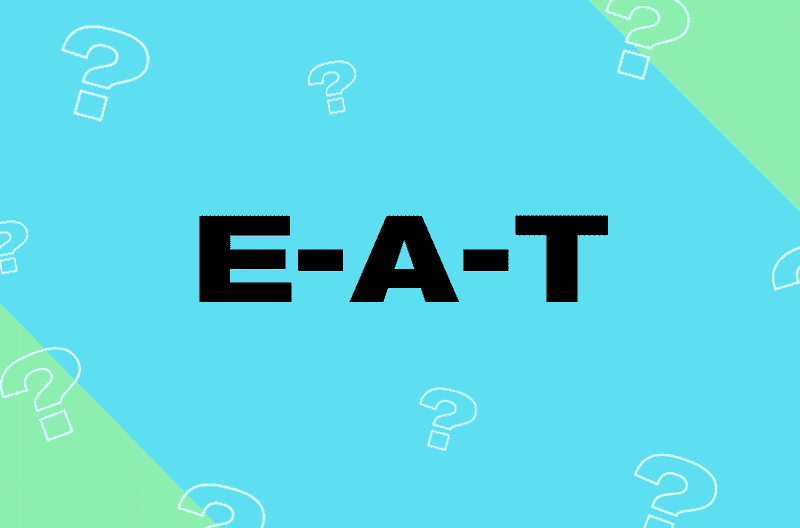22 April 2023
7 Questions to Ask Your Marketing Agency
Read More

It’s a familiar saying in the SEO world: content is king. But how does a good piece of content become great for SEO? It all comes down to one thing: E-E-A-T.
Google has been looking for ways to reward sites that have earned their status as authorities and experts in their fields, and that’s where E-E-A-T comes into play. Once just E-A-T, Google recently upped their game with the extra ‘E’.
But what does it mean and why should you be interested?
E-E-A-T is an acronym for experience, expertise, authority and trust. It’s a framework that Google uses to assess the quality of your content. Anyway, let’s take a look at each of these pillars in further detail, so you can start effectively measuring your content’s quality:
E-E-A-T is an extension of Google’s core mission to provide the best user experience. They want to show users content that is relevant, trustworthy and easy to digest. However, E-E-A-T isn’t a ranking signal on its own; rather it impacts how your site ranks in search results.
The concept of E-A-T is being upgraded with an additional “E” for experience. Google wants to understand how authoritative your content is, but they also want to know if you’re an expert in your field.
Authoritativeness, expertise and experience support a quality rater’s trust assessment. When someone visits your website and reads one or more pages on it, we want them to be able to answer two questions:
We want to know if we can trust your content. We want to know how much expertise you have in this field and whether or not we should listen to what you have to say about it. And we want to understand if the information presented is coming from a reliable source.
The most important way to show experience in SEO is by creating content that fits the searches of your target audience. This means that you need to know what kind of information they’re looking for and how they’re searching for it.
For example, if you have a website about hiking trails in the mountains, then “mountain hiking tips” could be a keyword phrase which would attract some visitors who are interested in learning more about mountain hiking tips.
Another way to show experience is through testimonials from clients or partners who’ve worked with you before on projects related to your field (for example: “We hired this company because they were recommended by another company we trust”). Testimonials provide social proof that helps visitors decide whether or not they want their own project done by someone else who has worked with people similar enough before – like yourself!
You also want people who visit your site frequently. That way, other visitors will be sure to come along too. There’s one solid way to get people naturally visiting your site: regular blog posts (and yes, even tweets).
Experience and expertise are two concepts that are often confused, so it’s important to understand the difference between them.
Experience is having done something before. An experienced SEO knows how to write content for search engines and optimize it for ranking, but that’s not all there is to it; they also have a good idea of what kinds of keywords will work well with their site’s audience and business goals.
Expertise is knowing how something works on an extremely detailed level–and being able to explain your knowledge clearly in writing or speech so others can understand what you know without having seen or done anything themselves! Expertise takes time, effort…and yes: experience too!
A strong backlink profile is an excellent way to show authority. This is because a link from another site that’s already established and trusted is seen as a vote of confidence in your work.
So how can you get more authoritative links? The first thing you need to do is create content that people want to share with others. You’ll also need to promote this content on social media sites like Facebook and Twitter, which are great ways for other people (and their followers) who share similar interests as yours to find out about it too!
The best way to become a trustworthy site is by being around for a long time. Sites that have been around for decades are likely to be more trustworthy than those that have only been around for a few years.
Google also looks at how many people link to you and how often you update your content. These factors help Google determine whether or not they can trust what you’re saying on your website, so if someone links back to one of our articles or we publish new articles every day, it will make us seem more reliable in Google’s eyes!
So, how do you show E-E-A-T in SEO? It all comes down to the content you create and how you use it. If you want people to trust your expertise, then make sure that all of your content is written by experts who know what they’re talking about. This will help them feel like they can trust what they read on your site without having any doubts about its accuracy or authenticity.
The same goes for authority; if someone reads something on one of your pages and finds it useful enough that they decide to share it with others (or just keep reading), then that means they like what they see!
Interested in improving your E-E-A-T? Let us help. We provide first-class SEO services, ready to overhaul your site and get you ranking in the long run.


Still the same great data driven services, but now with a different name